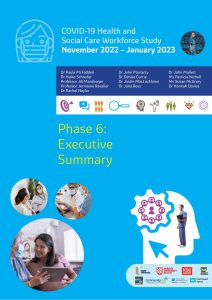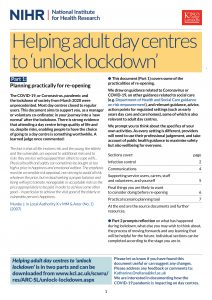The Health and Social Care Workforce Wellbeing and Coping Study has published its Phase 6 Report and Executive Summary. Researchers found the workforce faces continuing substantial pressure, staff shortages and is finding it difficult to cope. In this post, we summarise our findings.
Prof Jill Manthorpe, Director of the NIHR Policy Research Unit in Health and Social Care Workforce at King’s, is a co-investigator on this collaborative research project, involving also researchers from Queen’s University Belfast and Bath Spa University. The study is led from Ulster University (Dr Paula McFadden is Principal Investigator).(1604 words)
 The 6th Phase of this UK-wide multi-disciplinary study explored the impact of providing health and social care in the post-pandemic era from November 2022 until January 2023. The analysis builds upon the findings from five earlier Phases, beginning during May 2020 following the first wave of the COVID-19 pandemic in the UK. We received 14,400 survey responses from social workers, social care workers, nurses, midwives, and allied health professionals. We conducted 18 focus groups with frontline workers, managers, and Human Resource professionals.
The 6th Phase of this UK-wide multi-disciplinary study explored the impact of providing health and social care in the post-pandemic era from November 2022 until January 2023. The analysis builds upon the findings from five earlier Phases, beginning during May 2020 following the first wave of the COVID-19 pandemic in the UK. We received 14,400 survey responses from social workers, social care workers, nurses, midwives, and allied health professionals. We conducted 18 focus groups with frontline workers, managers, and Human Resource professionals.
The study provides a unique opportunity to gain in-depth understanding of how the pre- and post-pandemic times have impacted on health and social care workers’ working life, as well as effects on their own health and well-being. Our Phase 6 report presents survey findings collected over the six-months from the end of 2022 and up to early 2023. They reflect a difficult time of unprecedented industrial action in the NHS and continuing pressures on health and social care services. During this Phase, life was returning to pre-pandemic norms for most people in society, there were few remaining public restrictions, the use of face masks had generally ceased, although still being recommended in health and social care encounters and settings. Health and social care services were therefore adapting themselves to a post-pandemic time at the same time as still caring directly for people with illnesses related to Covid-19, and delays in seeking healthcare. Other impacts of the pandemic have placed increasing pressures on health and care services, such as sickness absences, staff vacancies, and retention problems, with mental health problems and new conditions such as ‘Long-Covid’, now affecting workforce stability.
Multiple workplace factors are described as a ‘vicious cycle’. For example, increased job-related pressures, exacerbated by staffing shortages and vacancies (increased use of agency or locum staff) add to job stress and this affects staff’s mental health and well-being. Some respondents indicate lasting or new depression and anxiety, or long-standing distress or trauma because of working through the pandemic. While the survey found many staff had made use of employer’s support services, not everyone sees them as accessible or helpful. Investment is still needed here; the report’s authors recommend. Continue reading




 Caroline Green
Caroline Green
 Dr Nayyara Tabassum is Evidence Officer in the
Dr Nayyara Tabassum is Evidence Officer in the 